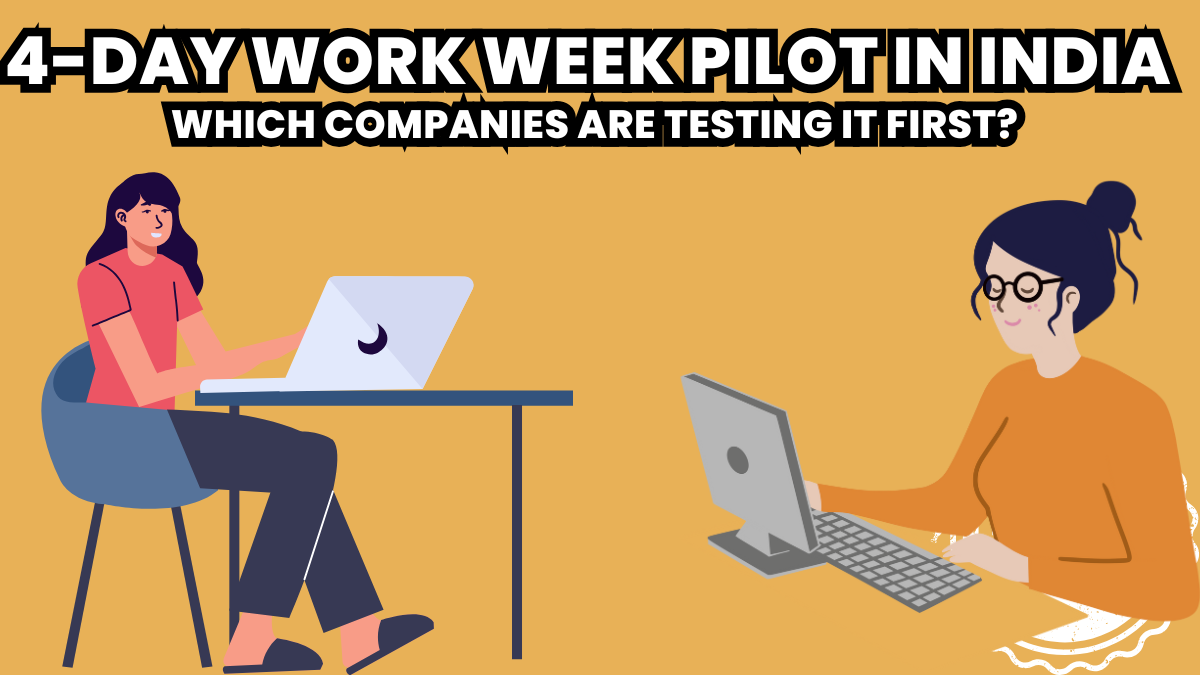The concept of a 4-day work week has been discussed globally for years, and in 2025, India is officially experimenting with it through pilot programs across select industries. The 4-day work week India 2025 initiative aims to balance productivity with employee well-being while testing whether Indian companies can adapt to shorter work schedules without affecting output.
With rising burnout levels and increasing demand for flexible work arrangements, companies are exploring ways to modernize work culture. Several Indian corporates, along with startups and multinational subsidiaries, have agreed to participate in this government-supported experiment. For employees, the program could signal a major cultural shift, redefining how work-life balance is achieved in India.

Why India Is Testing a 4-Day Work Week
The idea of reducing the standard workweek has multiple drivers in India:
-
Employee Well-Being: Addressing rising stress, long commutes, and work-related health issues.
-
Productivity Experiments: Studies in Europe and Japan suggest that shorter workweeks can maintain or even increase productivity.
-
Future of Work: Younger employees prefer flexible arrangements that allow more personal time.
-
Global Competition: Aligning with international work culture reforms to attract global talent and investors.
By testing this format, India is joining countries like the UK, Spain, and New Zealand, which have already seen promising results from 4-day week pilots.
How the Pilot Program Works
The companies testing 4-day schedule are following a simple framework:
-
Employees work four days a week but complete the same number of weekly hours (compressed schedule).
-
Some firms are experimenting with reduced total weekly hours (32–35 hours) without pay cuts.
-
Pilots are running for six to twelve months, after which data on productivity, employee satisfaction, and revenue impact will be reviewed.
-
Participation is voluntary, with companies allowed to opt in or out based on their business models.
The Ministry of Labour is monitoring outcomes closely to assess whether the model can be scaled nationwide.
Companies Participating in the Pilot
While not every company has been publicly named, industry insiders confirm that the pilot includes a diverse mix of organizations:
-
IT & Tech Firms: Several Bangalore-based software companies and startups are early adopters.
-
Consulting and Services: Some global consultancy firms with Indian offices are testing hybrid models.
-
Manufacturing Units: Select plants in Gujarat and Maharashtra are running trial shifts.
-
Startups: Fintech and e-commerce startups in Delhi NCR and Mumbai are experimenting with employee-friendly schedules.
A detailed list of companies is expected to be released later in 2025 as more firms join the program.
Benefits Expected from the 4-Day Work Week
Proponents of the 4-day work week India 2025 believe it can bring multiple advantages:
-
Higher Productivity: Focused workdays may reduce wasted time and improve efficiency.
-
Better Work-Life Balance: Employees gain more personal time for family, hobbies, or education.
-
Lower Burnout: Reduced stress and fatigue may lead to fewer sick leaves and higher retention.
-
Attracting Talent: Companies offering shorter workweeks may attract top talent in competitive sectors.
-
Environmental Gains: Fewer commuting days can reduce traffic congestion and emissions.
These benefits align with India’s broader vision of becoming a global hub for modern work practices.
Challenges to Implementation
Despite the optimism, there are hurdles to making the model a success:
-
Industry-Specific Barriers: Sectors like healthcare, banking, and retail may struggle with reduced workdays.
-
Compressed Hours Stress: Employees working longer hours on fewer days may feel more exhausted.
-
Productivity Tracking: Measuring output fairly across different roles remains a challenge.
-
Client Expectations: International clients operating on traditional schedules may expect round-the-clock availability.
Balancing these concerns will determine whether the program moves from pilot to policy.
Employee Reactions So Far
Early surveys suggest that employees welcome the move. Most respondents say they are willing to adjust working styles if it means gaining a three-day weekend. Younger professionals, especially in urban areas, see this as a major step toward modernizing India’s rigid corporate culture. However, some worry about longer workdays during the compressed schedule.
Final Thoughts
The companies testing 4-day schedule in India are at the forefront of a potential workplace revolution. While challenges remain, the 4-day work week India 2025 pilot represents an important experiment in aligning employee satisfaction with business performance.
If successful, India may see a gradual adoption of shorter workweeks across industries, reshaping the future of employment. For now, employees and employers alike are watching closely to see whether this bold reform will set new standards in work culture.
FAQs
What is the 4-day work week India 2025 pilot?
It is a government-supported experiment where select companies test shorter workweeks to assess productivity and employee well-being.
Which companies are testing the 4-day schedule in India?
Early adopters include IT firms, consulting companies, startups, and select manufacturing plants, with a full list expected later in 2025.
Will employees’ salaries be reduced under the new system?
In most pilots, salaries remain unchanged, though some companies may compress weekly hours into fewer days.
What are the main benefits of the 4-day work week?
It can improve work-life balance, reduce burnout, increase productivity, and lower environmental impact.
Click here to know more.
